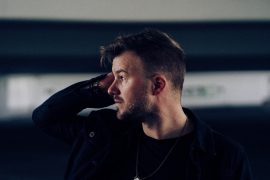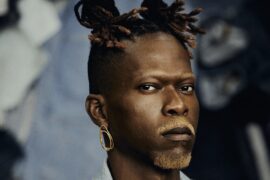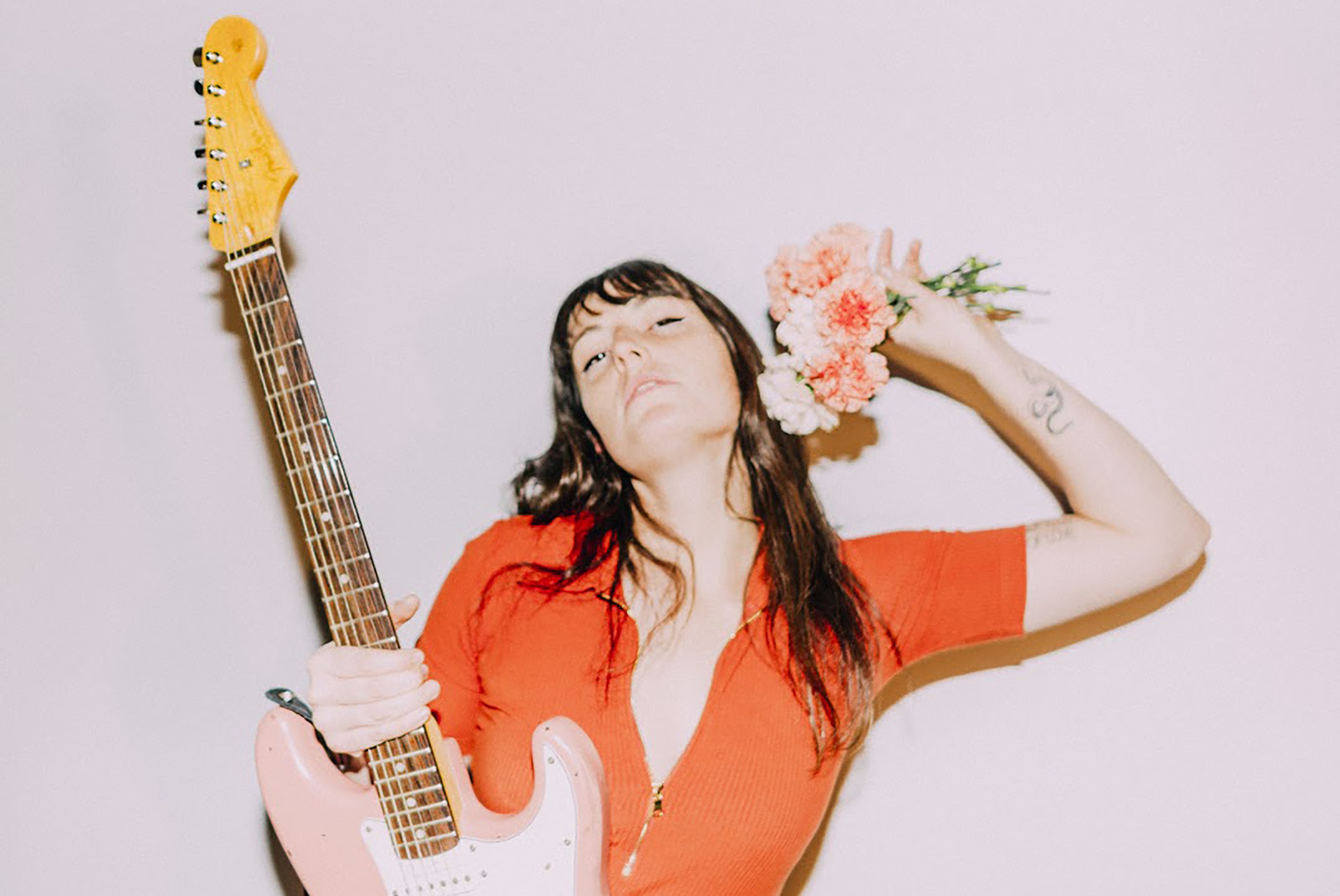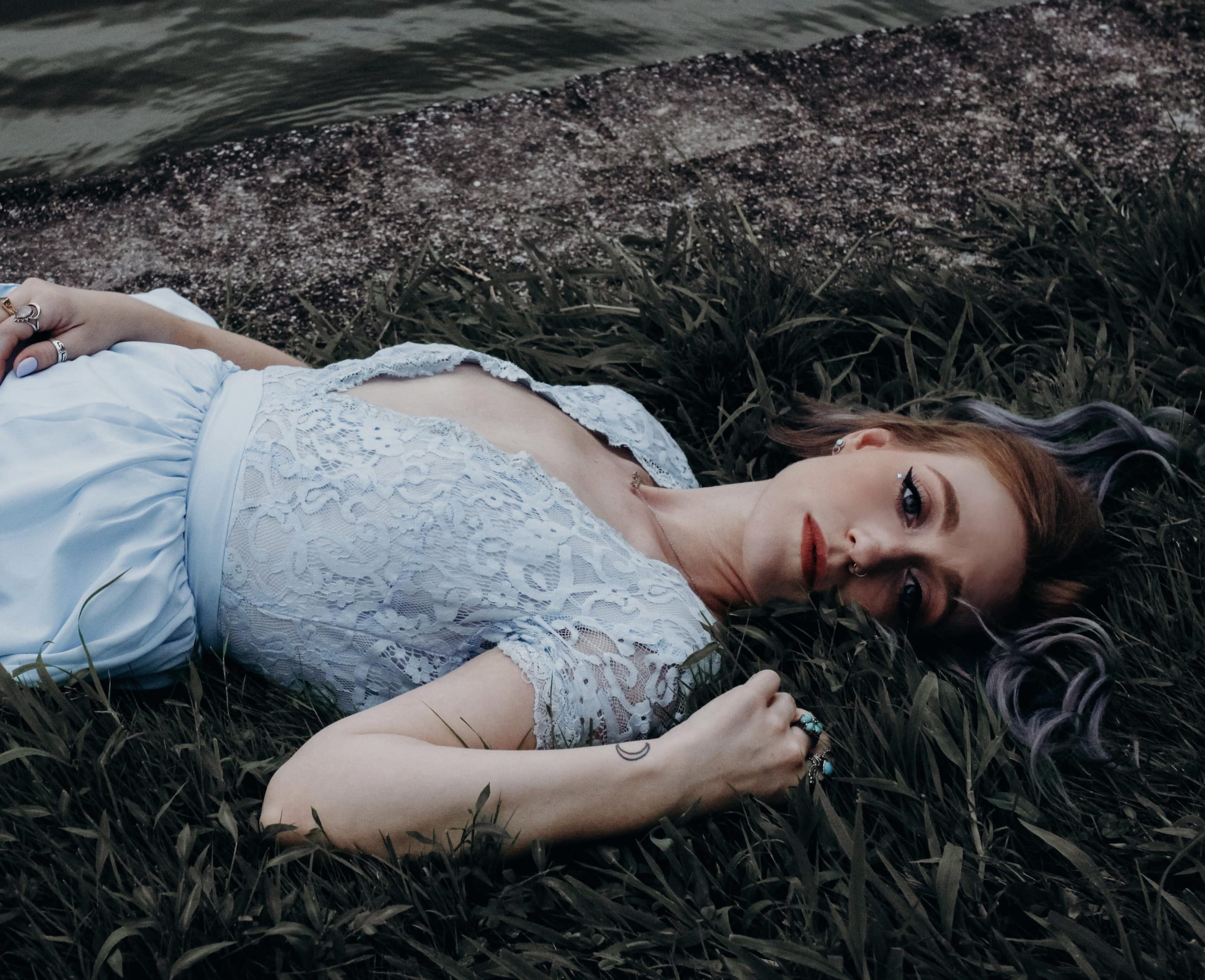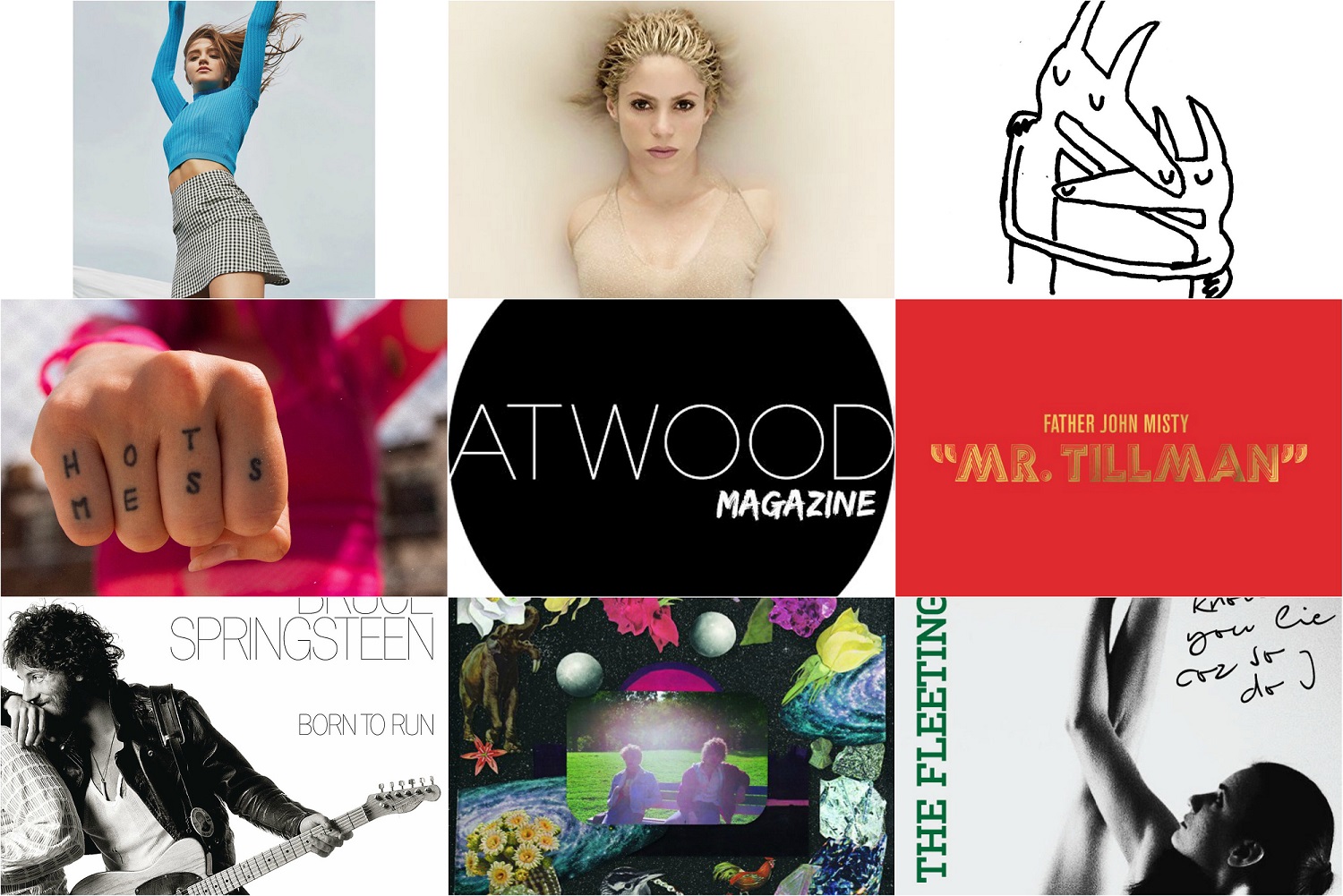Atwood Magazine speaks to 2022 Artist to Watch Suki Waterhouse about her upcoming debut album, how songwriting has helped her cope through years in the limelight, and romance.
— —
I‘ve always craved the rapture of love” says Suki Waterhouse, the actress, model and singer-songwriter as she reflects upon themes of the songs on her debut album. Waterhouse, who until now is better known for starring in high fashion campaigns for brands like Burberry and playing different characters in movies like the unique Assassination Nation and the romantic Love, Rosie, is finally opening up.
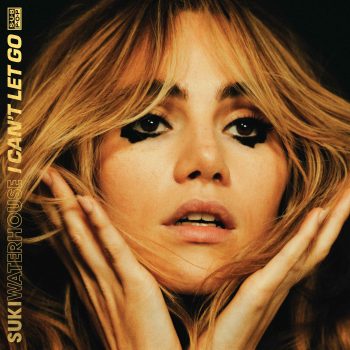
While she’s been content with a slow-burning music career, releasing one single per year since 2016’s “Brutally”, 2022 marks the year where Waterhouse is finally letting us into the musical universe she’s been creating since the age of 13. “I’m the same person that was looking out the window of the house that I grew up in and writing the same version of love songs that I was writing all the way back then”, says Waterhouse, about the confessional and romantic songwriting that’s been helping her navigate life, love, and the pressures of a public identity, among other things.
Waterhouse sings as if she’s pouring her heart out to a dimly lit bar, clouded by cigarette smoke, so entranced by the music that she doesn’t care if anyone is watching her. There’s a folky quality to her sound and the intimacy of her lyrics that hypotizes anyone who listens. She’s been chronicling all these years through music, each song a different chapter of the diary of her life, and now she’s ready to let us in.
“Moves” and “My Mind“, both singles off her album, find the balance between being certain about taking a step towards vulnerability and love and feeling like you’re losing grip of your sanity. “Moves” is bold and a classic, injected with the energy that only someone who is determined to give love a chance has, while “My Mind” is introspection at its best. Waterhouse’s latest single, “Melrose Meltdown” (a song that’s infamous among her friend group), is as gripping as a love story with a tragic ending. Cinematic and remarkable, “Melrose Meltdown” could easily soundtrack the climax of a movie about star-crossed lovers and ill-fated endings. I Can’t Let Go, Waterhouse’s debut album, is set for release April 22nd, 2022 via Sub Pop, and promises to let us in on the other chapters of her story.
Atwood Magazine spoke to Waterhouse, who’s one of our 2022 Artists to Watch, about I Can’t Let Go, falling in and out of love to fill the void, how music helped her deal with life in the limelight, and mementos she’s hoarded across the years.
Watch: “Melrose Meltdown” – Suki Waterhouse
:: A CONVERSATION WITH SUKI WATERHOUSE ::

Atwood Magazine: I have been a fan of your music since 2018. “Valentine” was one of the songs I stumbled upon on a Spotify playlist and was like, ‘Oh, God, no, I have to listen to this again’. I became obsessed with it, and that’s how I got here. So I’m so excited that you’re actually putting out an album.
Suki Waterhouse: I’m so excited! It’s taken me so long. It’s funny because making it I would have this thing where I was really, really – it’s still kind of uncomfortable and I feel quite shy about putting things out – but at that point, I was only putting out one song a year, basically, since about 2016. There was a particular moment of depression probably that I was in for like a few years that started all of the writing. It was something that I wanted more than anything, to finally have an album, but it wasn’t like, ‘Oh, I’m completely planning this’. But it’s funny because I think things happen like outside of yourself sometimes and you’re making something without really being aware, and then it kind of came to the point where it’s like, ‘Well, I don’t feel like I’m ready to put it out, but I think I’m as ready as I’ll ever be’.
You’re such a multi-hyphenated artist, you’re an actress, a model, a singer and a songwriter, but which one of these came first?
Suki Waterhouse: Making music was actually what I was probably doing most as like a young teenager. And then I guess the first kind of actual work I did, in terms of the word career, I suppose that was starting to do modeling when I was 14, 15. But I’m about to turn 30, and looking back on the last decade, I’m thinking about what I was writing about and all these things that happened to me and I’m so glad that all those things happened, because I ended up having a really interesting, quite crazy decade and there was a lot to put down and write about.
Watch: “Valentine” – Suki Waterhouse
It’s interesting that you mentioned you were writing and making music when you were a teenager, but it’s the last thing you’re actually putting out career-wise as Suki Waterhouse. How did you first get involved in music?
Suki Waterhouse: I think music really, it’s obviously the hardest thing to do. The hardest thing is basically getting the courage to feel like you’re ready to share the baring of your soul. But when I think back to being younger, the songs that I was writing in my bedroom at 13 and the context of them, it’s probably not that different to how I am like an adult now. I’m the same person that was looking out the window of the house that I grew up in and writing the same version of love songs that I was writing all the way back then. It takes a long time, and it was more to do with myself and and not feeling like just because people may know me as something else, that I should be ashamed to have this work that I want to show everyone.
As an already public person, but especially someone who’s either modelling or acting, to finally express yourself to people and have people be reintroduced to you in this process, so who is the Suki Waterhouse that people are going to get to know through your music?
Suki Waterhouse:I was thinking about this the other day, so I never have actually been very good at, you know, the kind of “using your voice” or taking to Instagram and telling everyone every detail of why something’s wrong about the way you’ve been perceived, or like the exact details. I find it really difficult. I want people to know how things felt, and I want you to be able to know how things feel. The details I don’t think matter as much as the feeling. And then I love that thing that you get to share with people where it’s like people know how something felt, and they get it, sharing a feeling more than the detail filling in. I made the album for girls, women who have fallen in love many times and lusted a lot, and maybe have also been a bit of a heartbreaker as well. That’s how I can sum it up.
You talked about the feeling a lot and there is such a universality to the things you say in your music, but it also comes across as very specific to situations, like “I’m going to put some moves on you”, that is something everybody has felt some time in their life. It can feel very specific to you in your situation because it feels very genuine when you're singing, but it also automatically is applicable to the listeners life and that creates such a deep bond with the music. There is something so beautiful about just singing about love and you know, pouring it into song.
Suki Waterhouse: When I wrote “Moves” I was kind of in this place where I had been heartbroken quite a few times before and it was sort of about, when you’ve been heartbroken a couple of times, actually the risk of going for somebody and saying ‘I’m actually going to put myself out there and and invest in this and want this and fully go for it’ becomes way more way more risky. There’s a small chance that you might have the reward but there’s also a way bigger chance that you might jump off the cliff and like break all your bones and like fall on your face. So that did have that kind of naivety to where it’s like ‘Oh, I haven’t done this in a long time and I’m kind of ready’ because falling in love a lot is very tiring. You get exhausted by it at some point. That was the gearing up to go for it again.
It feels very special to have this song as your first single from the album because I feel like, as women, we’re conditioned and socialised to play hard to get and wait for the man to chase you in a heterosexual relationship. It feels very empowering and significant that you’re starting this campaign, as a woman, saying you’re going to take that first step and put yourself in a position where we’re taught not to put ourselves in. But also to do that, just as a human being, is so vulnerable and scary. How do you think that “Moves” teases the rest of the album and helps people get to know you?
Suki Waterhouse: “Moves” is probably the the only song on the record where I had that kind of confidence, that new feeling. It’s one of the more recent ones, because every song is like a chapter of the past, all of them are about somebody in a specific situation. I’ve always confused the rapture of love, and all the way that I’ve found to fill my own voids. I’ve always craved the rapture of love, and sometimes I’ve completely run into things that like were so obviously doomed to not work. So I think this actually felt quite soft in a way, even though it’s kind of aggressive, it was actually, in reality, quite tender. Because I actually felt like I really took my time, for the first time in a while, to actually say ‘I’m going to put these moves on you’. But I’m also waiting, I actually have something to give this time – it’s not just because I want this, it’s also because I actually feel like I have something truly meaningful to give somebody in their life.
Watch: “Moves” – Suki Waterhouse
When you talked about potentially falling on your face it reminded me of the music video which is this hypnotizing, entrancing visual and then quite a tragic ending. I read that the idea of the music video came to you because you were dreaming about car crashes, but why did you choose to pair this visual with the song?
Suki Waterhouse: I think the feeling of falling in love is so traumatic in a way, you’re literally just walking around one day minding your business and you’re fine, like you’re absolutely fine. And then suddenly something happens in you, somebody, there’s something explosive that happens and your life is forever changed. I think it’s very traumatic, in a way, it’s so beautiful. But you’re completely changed and even if things work out, your life has still been hijacked, basically, and it will never be the same in so many ways.
But I think that the thing about crashing and moving towards something, it’s kind of been something that’s been a theme and in my life for years. I’ve had that before, when I first started writing and when I first put out “Brutally”, I had such a crashing moment at about 23. I was suddenly in a relationship that was incredibly public that I never spoke about. But I was so ill-equipped for the public nature of it as well and its toxicity. I had no idea how to deal with that, I was way too young, but then also these things that have played out publicly, the experience from that, it has felt like I’ve been winded sometimes and it doesn’t go away. And the shame attached to that, it kind of all connects. That has informed a lot of the things I’ve written, it’s informed how I feel about putting music out generally. It’s that fear of how it’ll be received.
Being able to write and express yourself, and have that music career start quietly and slowly, when you had this whiplash of public attention and were navigating a construction of identity that becomes public as well, and finding out how to save yourself and your essence in the middle of it. I can imagine it’s just insane. How did music help you go through it?
Suki Waterhouse: I really think it saved me in so many ways, because it’s like making a statue of exactly how you were and how you felt in that time. And it’s memorialising it, and I can listen to the first song that, in that moment, when I was my worst at about 23, I wrote “Brutally” and I was sobbing the whole time while I wrote it. I always had that need to write it down. And I think that, at the end of the day, I’m like, no matter how hard the times that you’re in might be, I always had the inclination to document it. That kind of confessional journaling, just to keep all of it down. And I would take a lot of photos as well of little things everywhere. I have so many photos, just to remind yourself of objects and everything, that always felt incredibly important. So it wasn’t knowing that I was wanting to start a music career or anything. It just felt very important to remember because I didn’t feel like I could like share exactly what where I was with anyone else. So it kind of it was making myself feel alive and remembering what had happened. I think as long as you write it down and make it into something, then who the fuck cares? That’s always more important to me, as long as you’ve made something from whatever you are going through that’s the best.
Watch: “Brutally” – Suki Waterhouse
We’re talking about something that happened maybe seven years ago, and when you mentioned how you look back on this decade as you're about to turn 30 and music has become kind of like your little catalog of moments. When you have so much music that you’ve been writing throughout this time, how do you choose what to put in your debut album? It’s a decade worth of moments and healing.
Suki Waterhouse: Well there’s there’s a couple of people, some are my close friends, who I was always sharing with, and you kind of know from them being like, ‘Where the hell is “Melrose Meltdown”? What the fuck?’ That is really helpful. Also, mostly, certain songs would have certain moments in my life or feelings that would be so imprinted, the song has to be about this, entirely specific. And these moments and these feelings, these are the strongest things that I felt at all. So that’s kind of how I would, you know, take them apart. It’s like, this is about this time, this is about this time, and it kind of became like a tapestry of those feelings. But yeah, it all started from around the age of 23 when I was very daunted, and kind of broke, and had no control over my own self at all and not enough emotional maturity, to understand the complexity of what I was kind of going through or anything like that. But yeah, so it became my lifeline.
I don’t think us, as people, are equipped to have as much exposure as you have today. Our brain is not equipped for that.
Suki Waterhouse: You just have to learn as you go past. It’s funny now I’ve gotten to this point where I have the songs together and I feel enough courage to put them out. The album is called, I Can’t Let Go because I really didn’t feel like I would ever be able to move past or reemerge or butterfly into anything else. I can already feel like it’s tying up, the decade is tying up. I do feel like once you let something go and express it, there’s this distance from it suddenly and even when I look around my life now, I’m so much more centred and happy and and I have these healthy things around me that are really beautiful. So it’s very cool that stuff, especially in the shit time that we’re in at this moment.
Once the songs are in the world, everyone says that they’re not yours anymore, right? So you’re literally letting this emotional baggage go and giving it to people.
Suki Waterhouse: Yeah, 100%. It’s your way of communicating things that you wouldn’t have been able to do otherwise.
I read that you made the album and after it was done you started sending it to labels. So you had full creative liberty and freedom, it was your own process with your producer. How do you think that having this much freedom and not having any expectation on you helped you make the album?
Suki Waterhouse: That was the great thing. So I had this own thing on my heart weighing really heavy like ‘I have to do this’, but also it was really nice for me just self-releasing, you know, one song every now and then and watching people react to that. Especially “Brutally”, I think that was a big deal for me because I put that song out and it just encouraged me very much to keep going. But the great thing about all of this songwriting, I never had a label being like, ‘hey, like better get this in by this day’. No, whatsoever. You’re never totally ready, but you just get to a point where you’re like, ‘I’m as ready as I can be’.
It’s funny the way stuff happens. It was more to do with the producer, Brad Cook, who I absolutely like love, like some of the records he’s done with Hiss Golden Messenger and Waxahatchee. I was like, I think that is who it would be. Because before then I didn’t actually know who would be the person to take like the recordings and make them into something that we could do together that would be a cohesive sound. I knew about him. And then my friend Dave Sitek from TV on the Radio, who I’ve written with before, he knew him too. So I managed to send the demos to him and he had two weeks and said, ‘If you can come to North Carolina, then we can do it’. And that is quite a strange thing, in a way, because usually you meet the person and know what they’re going to be like, and you’ve worked with him loads and I had never met him at all. But I called him and he’s like, ‘Well, what are you listening to right now?’ And I said, Lucinda Williams “Fruits of my Labour”, which is like the only song pretty much that I’ve listened to for like years, like every day. And he’s like, ‘Well, that’s my favorite song’.
I just knew, in a funny way, that everything would be okay, but very much just being like, this is something that needed to come out of me, it’s not had any outside force telling me to do it. I didn’t expect to find a label. I was just at the point where I wanted to self-release it. And then I started sending it to labels just to see what would happen. And, I mean, Sub Pop, I would never have fucking thought that they would want to do it.
You were someone who was releasing independently, to suddenly have Sub Pop jump on board.
Suki Waterhouse: That was maybe like my secret dream. It’s not really because you do other stuff or whatever. In fact, it’s very much I found the experience of sending it to labels very much like ‘No, you’re this, you’re that’. They are the coolest and it’s so wonderful to have that support from them, and have someone next to you guiding you it is great.
And it also helps you in your confidence, right? Navigating this whole new career and knowing that they’ve done all these amazing things with other artists and that they trust you enough to be alongside you.
Suki Waterhouse: Yeah, totally. So it’s definitely nice to have to have partners in all of it because it is a whole new experience for me.

The album is called I Can’t Let Go, but now that you’re letting go of the songs, what are other things you can’t let go of?
Suki Waterhouse: Will I always have this thirst to quench the things that I will acquire to fill the voids, will I be like that forever? Will I always crave like a rapture of experiences? Will I always feel this need to be derailed in some way, or will I always find myself being derailed. The things I can’t let go of, I suppose, are like, I think I’m kind of a mind hoarder. I hoard all these little things that I’ve treasured, and the things that I won’t be able to like maybe touch again, but they’re hoarded in my mind, and the things that are up here I will never be able to let go of. They’re the things that completely quench me in every way and I think always will.
Can you give me an example of something that you’ve mind hoarded?
Suki Waterhouse: This sounds really weird. There’s a lot of stuff up here but I’m also kind of a hoarder of memories too, so there’ll be things in the mind that I can’t touch again but if I can bring anything, I will. I have a golf ball from walking on a golf course with someone in the middle of the night, and I have a plate, a room service plate, with years and years’ old chocolate sauce is still dried. This has suddenly taken a very unromantic turn and I’m like, here are the things I have just lying around.
I don’t think it’s unromantic because I feel you’re getting items that can be physical representations of things that you can’t put into words.
Suki Waterhouse: Yeah, yeah, exactly. So there’s still things around like that. You can’t let go of the things I suppose that live in the past, of where reality and fantasy meet, and I always question my own – your own memories of something, they’re so unreliable in a way, aren’t they? The way that you’ve interpreted your life is incredibly unreliable; that’s why I always think it’s so much more helpful to express the feeling of something rather than the details.
Last question: what are a few words to describe your album for people who don’t know what to expect?
Suki Waterhouse: It’s for heartbreak and heartbreakers.
— —

Connect with Suki Waterhouse on
Facebook, Instagram, Twitter
Discover new music on Atwood Magazine
? © Dana Trippe


